Key takeaways
- Understanding Facebook’s targeting options is essential for musicians to reach the right audience effectively.
- Setting clear goals for music promotion shapes campaign strategies and helps measure meaningful success.
- Creating authentic ad content that tells a story leads to better engagement and connections with listeners.
- Regularly measuring ad performance and focusing on relevant metrics aids in refining strategies for better results.
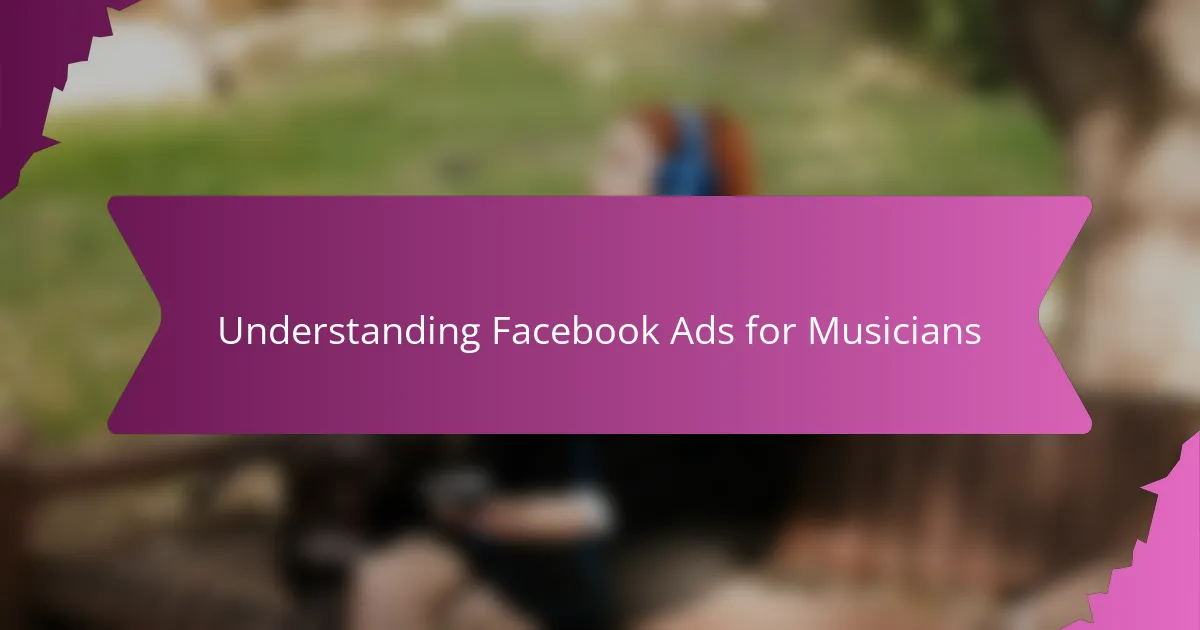
Understanding Facebook Ads for Musicians
When I first dipped my toes into Facebook ads for my music, I realized how crucial it is to truly understand the platform’s targeting options. Facebook lets you pinpoint your audience by age, location, music taste, and even behaviors, which means your music can reach not just anyone, but the right people who will actually connect with your sound. Have you ever wondered why some songs suddenly blow up while others barely get a listen? I believe targeted ads play a big role in that.
What surprised me most was how intuitive the ad setup can be once you get the hang of it. At first, the idea of setting budgets and choosing ad formats felt overwhelming—like throwing money into a void—but seeing real-time engagement reports changed everything. It’s like having a direct conversation with fans, even before they hit ‘play’.
Understanding Facebook ads isn’t just about clicks or likes; it’s about creating a bridge between your music and listeners who crave it. I often think, if I’d ignored learning this tool, how many moments of genuine connection would I have missed? Knowing how to use Facebook ads smartly can transform your music journey in ways you might never expect.
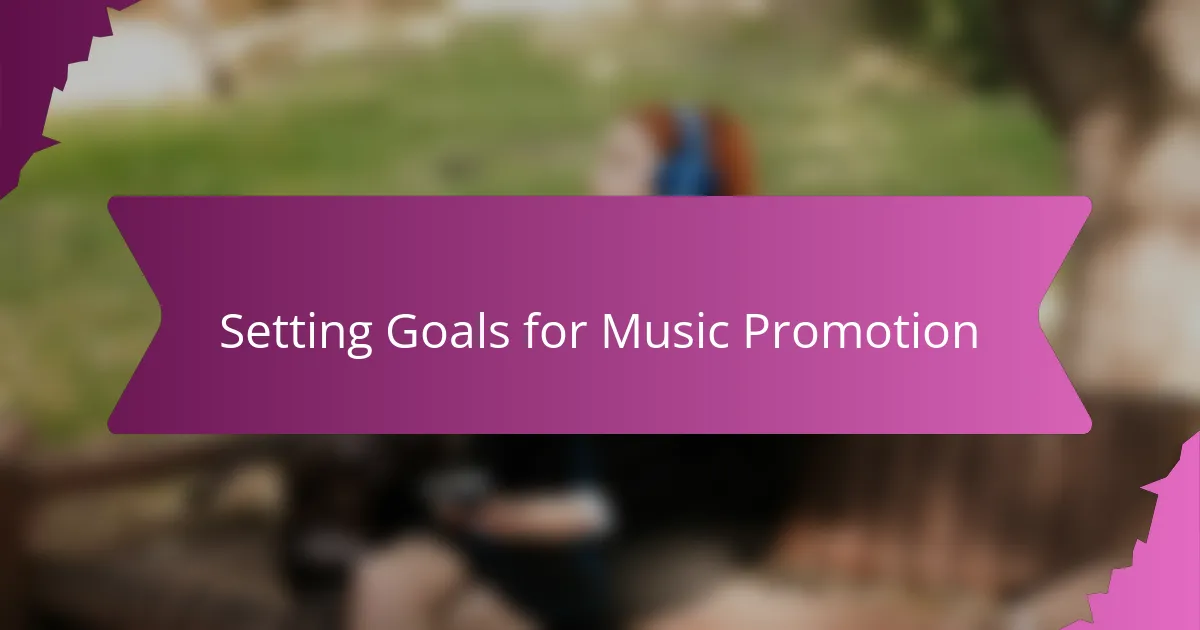
Setting Goals for Music Promotion
When I started using Facebook ads, setting clear goals for my music promotion was a game-changer. Without a defined objective—whether it was growing my fanbase, boosting streams, or selling merch—my campaigns felt like shots in the dark. Have you ever launched an ad just to wonder afterward what you really wanted to achieve? I learned quickly that knowing your goal shapes every choice you make.
For me, pinpointing a specific aim creates focus and helps measure success. Instead of getting distracted by vanity metrics like endless likes, I concentrated on meaningful actions such as profile follows or event RSVPs. That way, I could tell if my ads were truly connecting with people who cared about my music.
Sometimes I ask myself, what’s the one thing I want from this promotion? Defining that spark keeps the whole process purposeful and prevents wasted time and budget. It’s like tuning an instrument before a show—without that step, nothing sounds quite right. Setting goals isn’t just practical; it’s the difference between shouting into the void and starting a real conversation with listeners.
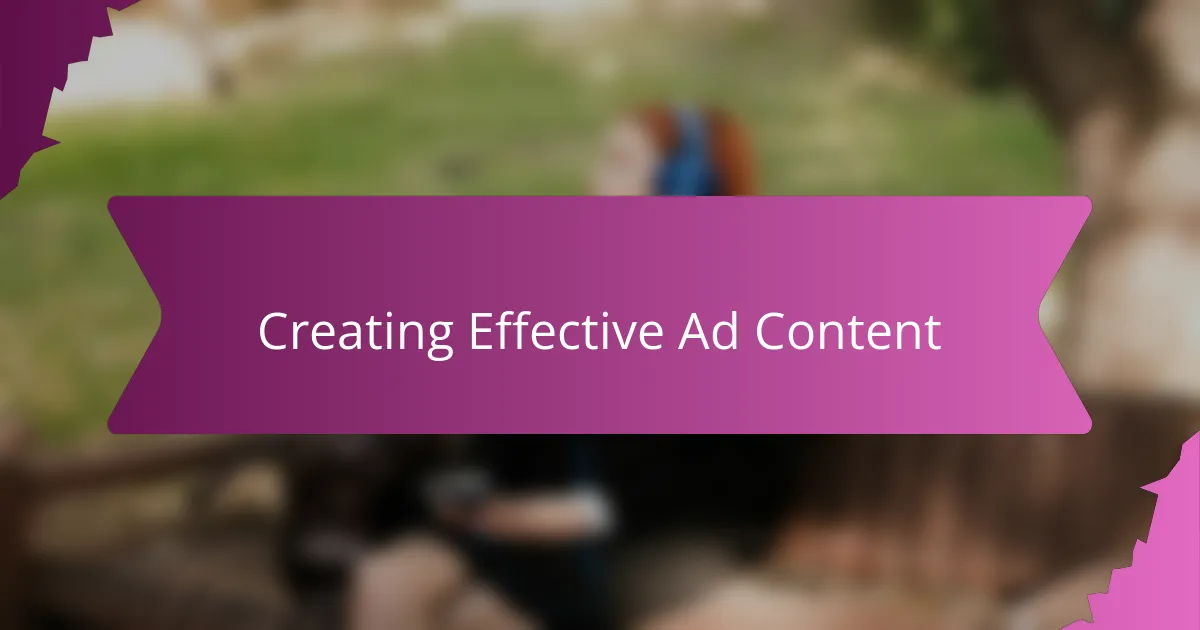
Creating Effective Ad Content
Crafting ad content that truly resonates is where the magic happens. I used to write generic blurbs about my music until I realized that telling a story or sharing what makes a song special grabs attention far better. Have you ever scrolled past an ad because it felt like just another sales pitch? I know I have, and I wanted my ads to feel like invitations, not interruptions.
Imagery plays a huge role too. Early on, I experimented with photos and short videos that reflected the vibe of my music rather than just flashy graphics. That personal touch sparked more curiosity and engagement. It made me think—people connect with authenticity, not just slick marketing language.
One trick I learned is to keep the message simple but emotionally charged. Instead of trying to say everything at once, I focus on one feeling or idea that my song evokes. That approach feels more natural, like chatting with a friend about music rather than pushing an agenda. Have you tried narrowing down your message this way? It changes the whole energy of the ad.
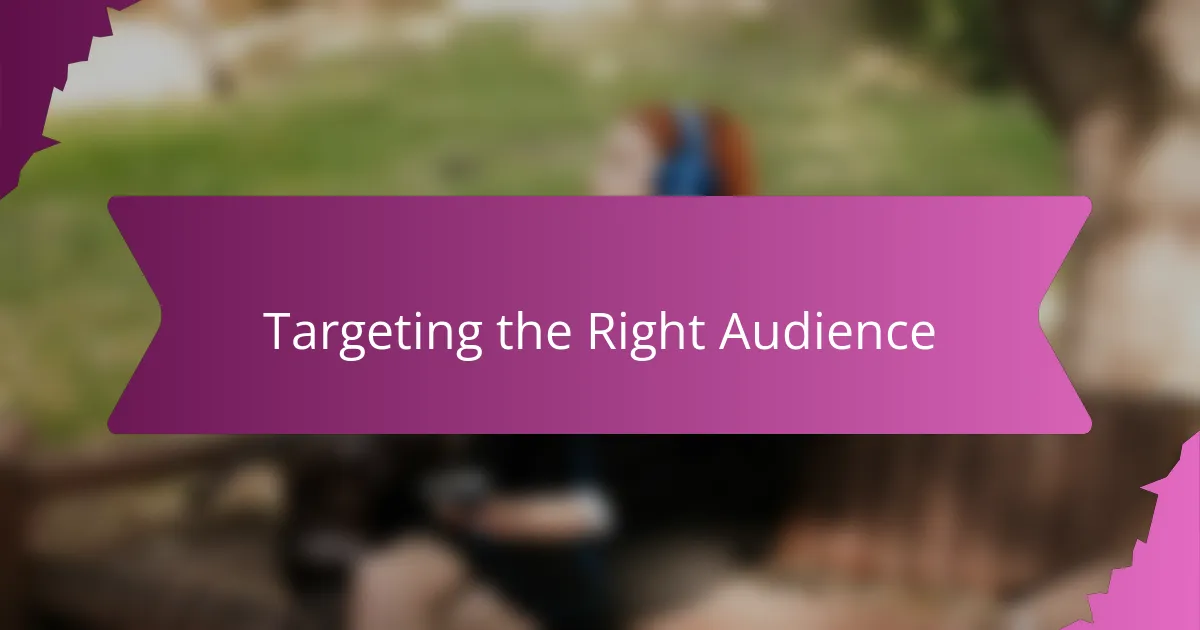
Targeting the Right Audience
Knowing who exactly you want to reach with your music ads on Facebook made all the difference for me. Instead of hoping my song would find listeners by chance, I could dial in on fans who already loved similar artists or genres. Have you ever clicked on an ad that just felt like it wasn’t meant for you? That’s what I wanted to avoid.
It took some trial and error to figure out which targeting options worked best. I remember tweaking age groups and locations, sometimes narrowing it down to just a few cities where my style had a following. Seeing my engagement rise in those specific places showed me that precision pays off faster than broad approaches.
I also realized that targeting behaviors—like people who attend live shows or follow music pages—helped me connect with listeners who were more than casual scrollers. It made me wonder: why waste budget on people browsing randomly when you can reach those already tuned in? Facebook’s tools feel a bit like a secret weapon when you take full advantage of them.
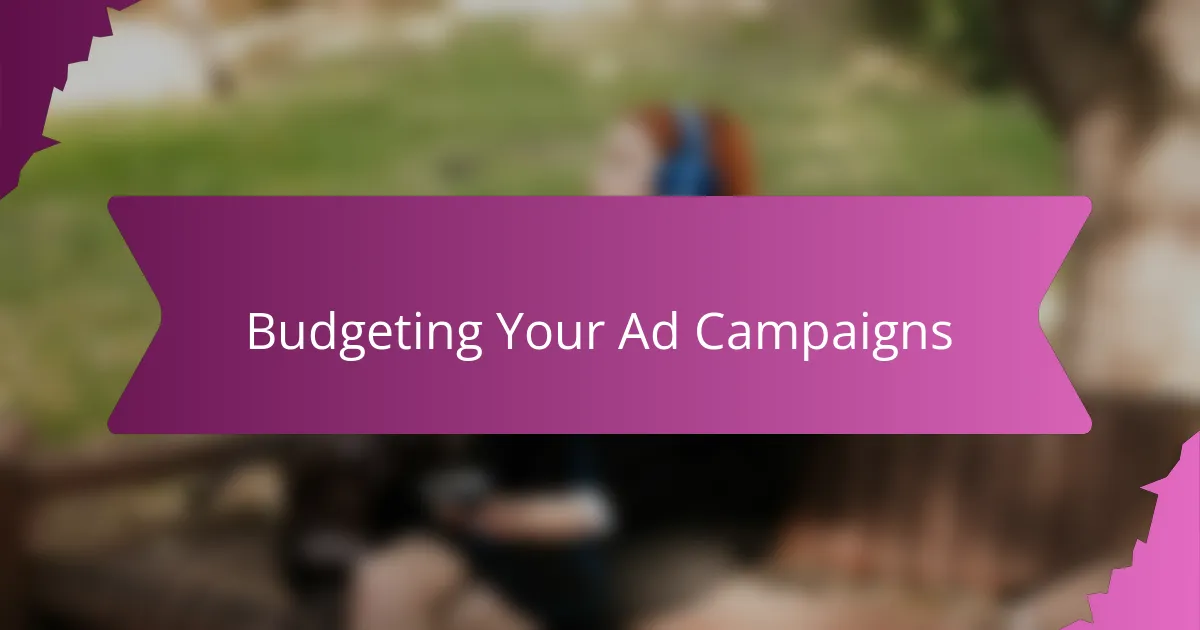
Budgeting Your Ad Campaigns
Deciding how much to invest in Facebook ads was one of the toughest parts for me. At first, I hesitated to spend more than a few dollars a day, worried I’d waste money without any payoff. Have you felt that sting of uncertainty, wondering if every cent is justified? Over time, I learned that starting small and scaling up as I saw results saved me from unnecessary risks.
I found breaking down my budget by campaign goals helped a lot. For example, I would allocate more funds to promoting a new single’s release, while giving less to general awareness posts. This strategy made every dollar feel intentional rather than scattered. It’s like tuning your spending to your music’s rhythm—each beat serves a clear purpose.
Sometimes, I ask myself: how much is my music worth to me? Setting a realistic budget means balancing passion with practicality. You want enough firepower to reach ears that matter, but not so much that you burn out your resources too quickly. Finding that sweet spot is key, and it takes patience and a bit of faith in the process.
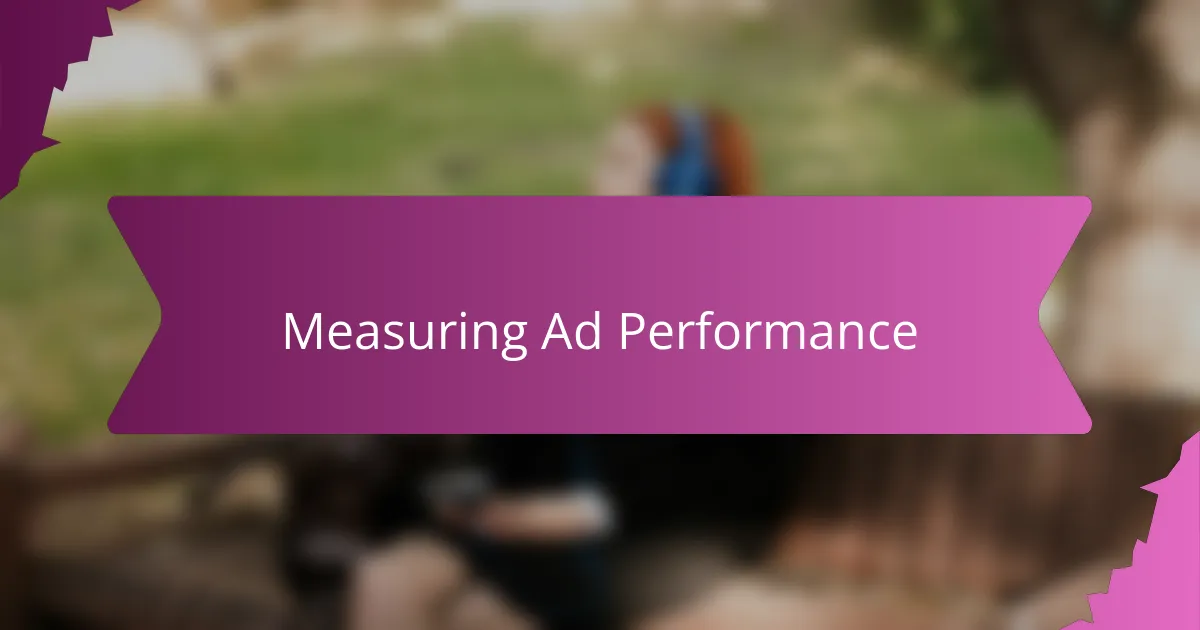
Measuring Ad Performance
Measuring the performance of Facebook ads felt like deciphering a secret code to me at first. I quickly learned that metrics like click-through rates and engagement numbers go beyond mere statistics—they tell you how well your music is resonating with the audience you chose. Have you ever stared at a dashboard wondering if those numbers actually mean anything? That’s where digging deeper into the data becomes crucial.
I found myself especially drawn to conversion tracking, like how many listeners actually followed my page or clicked through to stream a song. These actions felt like small victories, validating that my ads weren’t just noise but meaningful connections. Sometimes, I even compared different ads side-by-side to see which content or targeting sparked the most genuine response—it was like running little experiments with my own music.
Yet, it’s easy to get lost chasing every metric. I remind myself to focus on the ones aligned with my goals, whether that’s gaining loyal fans or driving ticket sales. Measuring ad performance isn’t just about numbers; it’s about understanding the story those numbers tell about my music’s journey to listeners. What’s your story revealing?
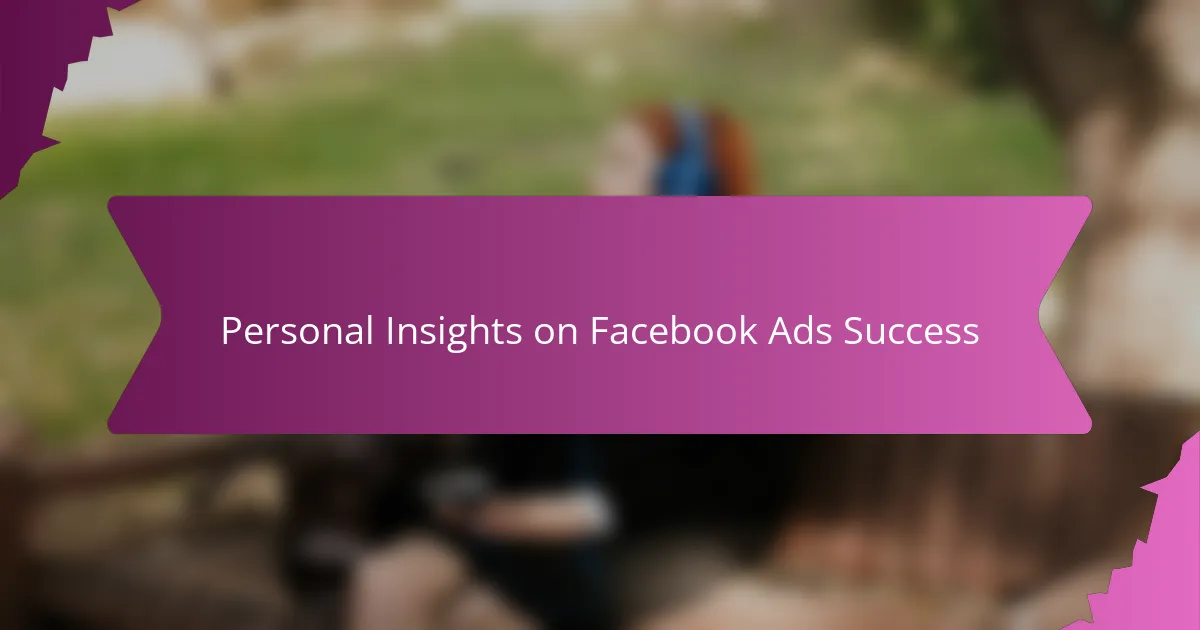
Personal Insights on Facebook Ads Success
When I first started seeing small wins from my Facebook ads, it felt like a breakthrough—a moment where effort met real connection. Have you ever experienced that thrill when a carefully crafted ad suddenly resonates with the right people? For me, those early successes weren’t just about numbers; they were affirmations that my music had found an eager audience.
I’ve learned that success with Facebook ads isn’t overnight. It’s about patience and constant tweaking, like tuning a guitar until each string sings just right. Sometimes an ad that seemed perfect at first needed subtle changes in wording or visuals to truly click with listeners—proving to me that perseverance pays off more than a quick fix.
What really stands out to me is how personal the whole process feels. Watching engagement grow and messages from new fans roll in created a sense of community I hadn’t anticipated. It made me think: isn’t that the real success of music promotion—not just reaching ears but touching hearts?